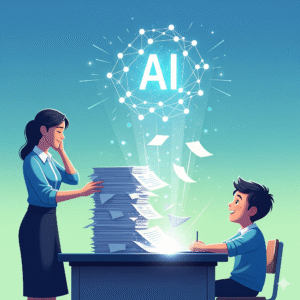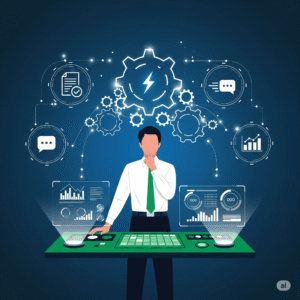Have you ever imagined a world where your financial tasks are handled by a super-smart robot that never gets tired and never makes a mistake? That’s not science fiction anymore. AI in finance and accounting is making that world a reality, transforming the way businesses and people handle their money. It’s like upgrading from a simple calculator to a powerful supercomputer that can not only do math but also predict the future.
This isn’t about getting rid of jobs, but about making them better. AI is the new partner for financial professionals, helping them with the boring, repetitive parts of their work. This frees them up to do more important things, like giving smart advice, planning for the future, and solving big, complicated problems.
This article will explore how artificial intelligence is becoming a must-have tool for financial services. We’ll explain what it does in simple terms, show you some real-world examples from big companies, and even give you tips on how you can start using it yourself. Get ready to see how AI is changing the world of money, one smart step at a time.
AI for Fraud Detection: The Super-Smart Security Guard
Imagine you have a piggy bank, and every time someone puts money in or takes it out, a little guard watches carefully. If the guard sees something weird—like a friend who never uses their own money suddenly taking a lot of yours—they would sound an alarm. That’s exactly what AI for fraud detection does, but on a massive scale.
In the past, banks and accounting firms used simple rules to spot fraud. For example, a rule might be: “If a credit card is used in two different countries in five minutes, flag it.” But sneaky fraudsters can easily get around these simple rules.
AI, however, is much smarter. It uses a type of technology called machine learning to look at millions of transactions all at once. Also, It learns what “normal” behavior looks like for you. It knows you usually buy coffee in your neighborhood and pay your bills on time. So, if your card is suddenly used to buy a luxury item in a country you’ve never visited, the AI immediately flags it as a potential scam. Because AI systems learn and get smarter over time, they can spot new and creative types of fraud that no one has ever seen before. This not only protects your money but also saves businesses billions of dollars every year.
Financial Analytics with AI: A Crystal Ball for Your Business
Every business wants to know what will happen next. Will sales go up or down? Will a new product be successful? In the past, people would try to guess by looking at old spreadsheets, but this was a slow and often inaccurate process. This is where financial analytics with AI comes in. Think of it as a crystal ball that doesn’t just guess but uses a huge amount of data to make incredibly smart predictions.
AI can analyze things like market trends, customer behavior, and economic reports much faster than any human ever could. For example, an AI can look at a company’s sales data from the last five years, see how it was affected by holidays or special events, and then use that information to predict how many new products will sell next month.
This ability to predict the future helps companies with:
- Forecasting: Making smarter guesses about future income and expenses.
- Budgeting: Creating more accurate plans for how to spend money.
- Investing: Deciding where to put money to get the best returns.
With financial analytics with AI, businesses can stop simply reacting to what happens and start planning proactively. They can see problems before they even begin and make smarter decisions that lead to more success and stability.
AI for Risk Management: The Smart Weather Forecaster
Risk is a big word in finance. It basically means the chance that something bad will happen, like an investment losing value or a customer not paying their bills. Managing risk is all about preparing for these bad things so they don’t cause a lot of damage. AI for risk management acts like a super-smart weather forecaster for money.
Just as a weather app looks at wind speed, air pressure, and temperature to predict a storm, an AI system looks at things like:
- Credit history: How well someone has paid their bills in the past.
- Market volatility: How much the stock market is jumping up and down.
- Global news: Big events happening around the world that could affect the economy.
By analyzing all these factors at once, the AI can tell a bank which loan applicants are most likely to pay back their loans. It can also warn a company if a certain investment is becoming too risky. This helps banks lend money more safely and helps companies protect their investments from sudden changes in the market. As a result, AI helps businesses avoid financial storms and stay on a stable path.
Case Studies: How Real Companies Are Using AI in Finance and Accounting
The best way to understand how powerful AI is is to look at real companies that are using it right now. These examples show how AI in finance and accounting is being put into practice.
Case Study 1: Mastercard’s AI Fraud Detection
Mastercard processes billions of transactions every single day. To protect all those customers, they developed an AI system called Decision Intelligence. This system uses machine learning to learn your normal spending habits, like where you shop and how much you usually spend. If a transaction doesn’t fit your normal pattern—for example, a large purchase at a store you’ve never visited—the AI flags it in a fraction of a second. This has helped Mastercard dramatically reduce false alarms (when a good transaction is flagged as bad) and has also helped them stop countless real fraud attempts before they happen. This is a brilliant example of how AI for fraud detection can provide protection on a massive scale.
Case Study 2: J.P. Morgan Chase’s AI for Financial Analytics
J.P. Morgan Chase, one of the world’s biggest banks, uses AI to analyze mountains of financial data to make smarter trading and investment decisions. Their AI tools look at market trends, news headlines, and historical data in real-time. The AI can process this information in seconds, allowing the bank to make fast, data-driven decisions that human traders could never make on their own. This helps them optimize their investments and manage risk more effectively. It’s a perfect example of how financial analytics with AI can give a business a powerful edge.
Case Study 3: The Use of AI by Big Accounting Firms
Big accounting firms like Deloitte and Ernst & Young are using AI to make auditing much faster and more accurate. Auditing is a process where accountants check a company’s financial records to make sure everything is correct and there’s no funny business going on. In the past, an auditor could only look at a small sample of transactions. With AI, they can now analyze 100% of a company’s transactions in minutes. The AI can find unusual patterns or small errors that a human might miss. This not only saves a huge amount of time but also makes the final audit report much more reliable.
How to Get Started with AI in Finance and Accounting: A Simple Guide
Feeling a bit overwhelmed? Don’t be! Getting started with AI is easier than you think. You don’t need to be a programmer or a data scientist. You just need to know what you want to improve. Here’s a simple, beginner-friendly way to start using AI:
- Identify a Repetitive Task: Think about a financial or accounting task you do every week or every month that is boring and takes a long time. Is it entering data from invoices? Or maybe it’s creating a simple report?
- Look for a Simple Tool: Find a tool that specializes in that one task. Many accounting software programs now have built-in AI features that can automate simple things like data entry or categorizing expenses.
- Start with a Trial: Don’t pay for a tool right away! Many companies offer a free trial. This lets you play with the AI and see if it actually saves you time and effort before you commit to anything.
- Practice and Play: Just like a video game, you’ll get better the more you use it. Use the AI on a small project first, and watch how it works. Then, you can gradually start using it for bigger and more complex tasks.
- Focus on the New Job: Remember, the goal is not to become an AI expert, but to use the AI to become a better financial professional. The time you save on boring tasks can be used for more exciting things, like helping a client with a new business idea or finding ways to make your company more profitable.
Must-Have AI Tools for Your Financial Toolkit
The right tools make all the difference. As AI in finance and accounting becomes more popular, a lot of great software has come out to help. Here are a few that are highly rated and easy to use.
- Tipalti: This tool automates the accounts payable process. Think of all the work involved in paying your company’s bills—getting the invoice, checking it, and making the payment. Tipalti’s AI can do all of that automatically, saving countless hours and reducing errors.
- Datarails: This is a great tool for financial analytics with AI. It connects to all your different financial data sources and uses AI to turn all that information into easy-to-understand reports and charts. It helps you see what’s happening in your business in real-time.
- Feedzai: This platform is a leader in AI for fraud detection. It uses machine learning to protect banks and financial companies from scams and cyber-crimes. It analyzes transactions instantly to stop fraud before it can do any damage.
- Sage Intacct: This is a powerful cloud accounting software that uses AI to automate many common accounting tasks. It helps businesses automate things like financial reporting and transaction matching, giving finance teams more time for strategic work.
These tools represent the very best of AI for risk management and efficiency, helping businesses stay ahead in a competitive world.
What is artificial intelligence (AI) in finance? – IBM
AI Marketing Insights: Your Secret Weapon for Smarter Strategy
The Bigger Picture: What This Means for the Future
As we move forward, AI will become a standard part of how we handle money. A report by Deloitte highlights that AI is becoming “very or critically important” to financial services. This isn’t just a small change; it’s a big shift in how businesses operate. AI will automate the tasks that are most time-consuming, such as data entry and invoice processing. This frees up financial professionals to act more like strategic advisors.
Furthermore, a study from Gartner suggests that AI will eventually handle up to 80% of routine accounting work. This means accountants won’t be just number-crunchers; they will become essential business partners, using their skills and the power of AI to guide their companies toward a successful future. The human touch—creativity, ethical judgment, and personal relationships—will become more important than ever.
In conclusion, AI in finance and accounting is about creating a smarter, safer, and more efficient way of managing money. By embracing these new technologies, businesses can protect themselves, make better decisions, and prepare for a future where humans and AI work together to build a more prosperous world.
AI in Finance: Applications, Examples & Benefits
AI Job Market Predictions: Is Gen Z Right to Fear Permanent Unemployment?



